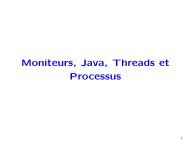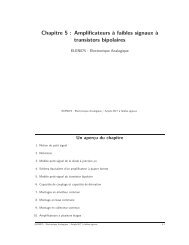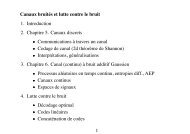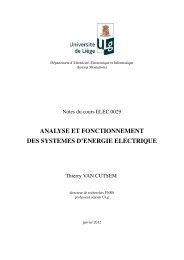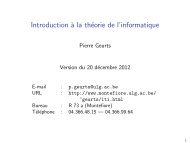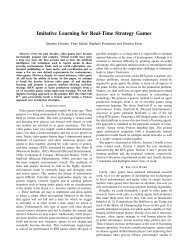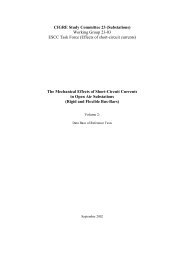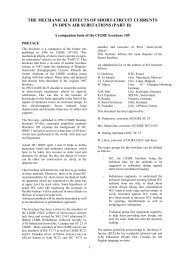Session 1 - Montefiore
Session 1 - Montefiore
Session 1 - Montefiore
You also want an ePaper? Increase the reach of your titles
YUMPU automatically turns print PDFs into web optimized ePapers that Google loves.
Life Cycle Assessment of Buildings – a review<br />
Sigrid Reiter, ArcelorMittal International Network in Steel Construction,<br />
Sustainability Workshop and Third Plenary Meeting, Bruxelles, Belgique (07/07/2010)<br />
uncertainty analysis for improving decisions and comparability of the LCA results.<br />
Finally, although the general LCA methodology is well defined, its application in the building industry<br />
still suffers from a lack of sector-specific standardization. This implies that making a full LCA of a<br />
building is not a straightforward process like for many other consumer products. But the interest of<br />
LCA at the building level is obviously that decisions based on isolated LCA for materials or<br />
components might lead to unexpected secondary effects when the materials or components are applied<br />
in buildings without taking into account their impact on the performance of the building as a whole<br />
(Verbeeck &Hens 2010). Moreover, case studies of IEA Annex 31 (2005) showed that LCA tools<br />
affect descision-making. The case studies all demonstrated that the application of life-cycle assessment<br />
tools resulted in significant environmental improvements. Using an assessment process during the<br />
design phase created a positive impact on the built environment and in most instances on the users.<br />
3. LCIA tools for buildings<br />
Several LCIA tools have been developed to help building designers incorporate LCA into building<br />
design (Bribian & al. 2009). They can be used to guide general building planning, select building<br />
materials and components or evaluate a complete building. They vary in their areas of application,<br />
geographic relevance and data quality. The amount of LCIA expertise and time required to employ<br />
these different tools varies also widely.<br />
There are three main types of LCIA tools :<br />
• Detailed LCA modeling tools (material level)<br />
Detailed LCA tools are focusing on materials, components and processes. These tools are<br />
mainly used in selecting materials, while also allowing material producers to optimize<br />
production processes. The software GaBi (an engineering oriented tool), developed at the IKP<br />
University of Stuttgart in cooperation with PE Product Engineering GmbH, is an interesting<br />
example of this type of complex tools. Other examples : Simapro (an industrial design<br />
oriented tool), TEAM (a French software which has been applied to many European projects<br />
including building and waste management), Boustead (a UK LCA tool that is building and<br />
construction focused although it can be used for other purposes), BEES (Building for<br />
Environmental and Economic Sustainability, a USA based software which allows the<br />
balancing of environmental and economic performance of building products; NIST 2001), …<br />
• Design LCA tools (building component level)<br />
Design tools use LCA as a basis but are simplified to single indicator points or to an<br />
aggregation of impacts to building component levels. These tools include pre-set material<br />
data. The aim of these tools is to facilitate easy use by designers and architects. The software<br />
Equer, developed at the “Ecole des Mines de Paris”, is an example of this type of LCA tool<br />
dealing both with the materials environmental impact and building operational impact. LCAid<br />
combines LCA results form materials with the operational modeling capabilities of EcoTect.<br />
EcoQuantum, developed in the Netherlands, uses SimPro LCA capabilities and has building<br />
components defined but it has limited operational energy and water capabilities. Other<br />
examples are : Athena (ATHENA 2001), Envest (BRE 2002), LISA, Becost, BEAT 2000,<br />
Greencalc, Ecoeffect, …<br />
Page<br />
10



